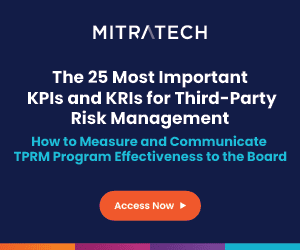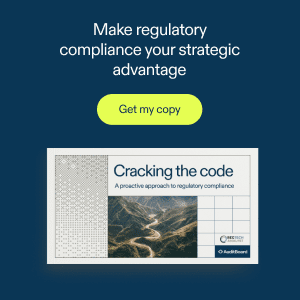Regulatory compliance is a fact of life for every enterprise. And since security has been in the hot seat lately, everyone’s paying more attention – and concern – to compliance. Businesses face increased scrutiny and are tasked with managing a growing number of regulatory requirements that must be met. At the same time, competitive pressures are mounting with the development of new technologies and the evolution of customer expectations for digital experiences. Is it possible for businesses to deliver new products and services at high velocity while still satisfying their obligations for compliance?
In every company, software is playing an increasingly pivotal role. Software-based services are often the primary way a company connects and communicates with customers. From sophisticated banking services accessed entirely through mobile phones and browsers to automobiles differentiated in the market by how well they integrate with the consumer’s technology ecosystem, software is today’s competitive currency.
Enterprises have more motivation than ever to reconcile the conflict between complying with regulatory requirements and competing in the fast-moving digital marketplace. Insert DevOps.
DevOps for Compliance
DevOps is the word used to describe the journey every company is on to become software-driven; it is a cultural movement that encourages collaboration and communication between previously disparate and siloed teams to automate changes frequently and reliably. A central theme of DevOps is that quick-moving (or high-velocity), streamlined operations help maintain safety in a dynamic, changing environment.
Traditional compliance efforts often aim for initial roll-outs that are complete, finished solutions. Even within a narrow scope, such as a single system or department, a complete solution can be very complex. As a result, organizations often underestimate the technical complexity and impact of changes on the organization’s processes and procedures.
It is increasingly rare for a set of policies to be specified in sufficient detail that they can be directly translated into implementation. The result of most “big bang” compliance efforts is one or two attempts at clarity on what needs to be done but, for largely political or organizational reasons, these attempts rarely reflect the actual effectiveness of a given method. It’s simply too difficult to revisit decisions and rework an existing implementation or adopt a new one.
DevOps encourages many small iterations and continuous updates, with maximum cooperation across technical and business disciplines. Rapid iterations make it possible to test the system “in the wild” and produce applications that delight users and don’t terrify those who maintain them.
Here we see an emerging theme. Technology professionals are more important than ever in ensuring compliance. Enterprises that apply DevOps principles to compliance efforts will be sustainably compliant, able to produce stable and secure systems that can easily scale and shift to meet rapidly changing requirements and environments.
Compliance as Code
Applying DevOps to compliance initiatives requires a key step: treating compliance as code. When you’re able to bring compliance into the software pipeline, you remove laborious processes of paper trails, reviews and multiple sign-offs spanning weeks and months.
There’s a longstanding battle between staying compliant and running at high velocity. Compliance asks, “Can you prove it?” and the number one priority for achieving velocity is “Can you reduce drag to create practical business advantages?”
As more and more requirements creep up, the room for error in manually checking compliance grows. This means a whole new approach is necessary to meet the needs of expanding businesses — one that allows them to still meet regulatory hurdles. Compliance can be inserted into the software production, updated and tested in a safe, automated environment that can be scaled up or down as needed.
We can understand compliance requirements as rules, internally or externally mandated, to which an organization or business function must adhere. Security penetration testing, anti-money-laundering procedures and bring your own device (BYOD) initiatives are all instances of compliance activities. Of course, some compliance efforts fall outside the realm of information technology. For example, there is very little technologists can do about asset liquidity, foreign exchange risk or Generally Accepted Accounting Principles (GAAP) reporting.
What technologists can do is ensure that our systems support these compliance initiatives and are stable, reliable and secure. In most large organizations, what we receive as compliance requirements are unclear and fuzzy. Compliance regimes evolve, as do the underlying standards. Your infrastructure and applications change, as do those who manage them. And with totally separate teams managing development and compliance, it’s a wonder more companies don’t leave themselves susceptible to security breaches.
Adopting DevOps practices for compliance not only allows you to keep systems compliant as standards evolve, but also brings these two previously siloed departments together for the greater good of the business and its customers. As enterprise compliance faces even greater and more fluctuating regulations and scrutiny, security and compliance can no longer be an afterthought when it comes to providing a digital-first experience.













